|
Dr. Angela Menz My impression of
Kenya is that of a beautiful and spirited country ravished by AIDS and
poverty. It is an ironic description, but the theme repeats itself as you
travel and work in Eldoret. The city seems full of people so generous and
kind who are
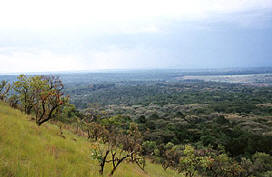 appreciative of your care and your presence, but they struggle for food
and money. They sell their fruits and vegetables for pennies hoping to
provide for their families. But their greetings are always warm and
heartfelt and every passerby says "Jambo" (hello) and responds "Nzuri"
(I'm well). The people rise with the sun and go to bed with the sun. They
live without our modern distractions and make you realize how different
our life is from theirs, but also how we have chosen to have those
"distractions" in our life, and how we can change our life to be as
pleasurably simplistic as theirs.
appreciative of your care and your presence, but they struggle for food
and money. They sell their fruits and vegetables for pennies hoping to
provide for their families. But their greetings are always warm and
heartfelt and every passerby says "Jambo" (hello) and responds "Nzuri"
(I'm well). The people rise with the sun and go to bed with the sun. They
live without our modern distractions and make you realize how different
our life is from theirs, but also how we have chosen to have those
"distractions" in our life, and how we can change our life to be as
pleasurably simplistic as theirs.
In the hospital, the people are so thankful for our presence and touch,
despite the fact many of them are dying. Their families travel great
distances on foot to see the "daktari" (doctor). The wards are full of old
rusting iron beds lined against the wall where patients can sleep 2-3 per
bed. They never complain or demand to be moved, they are again, just
appreciative of the our care. The sun provides the light and the open
windows the ventilation. The sheets are old and dingy, the charts are
paper
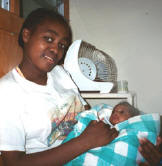 folders,
and the diagnostic tests are limited and often inaccurate. When you first
arrive as the "consultant" (teaching staff), you can become frustrated by
the fact that the students do not examine the patients daily, there are
usually no vitals, the labs take days to return (or may be lost), and the
therapies are limited for these who are critically ill. But the Moi
hospital helps the people of Eldoret. Patients survive and go home to
their families. Moi hospital provides education and jobs to many of the
people. It provides a source of healing and hope for the community. folders,
and the diagnostic tests are limited and often inaccurate. When you first
arrive as the "consultant" (teaching staff), you can become frustrated by
the fact that the students do not examine the patients daily, there are
usually no vitals, the labs take days to return (or may be lost), and the
therapies are limited for these who are critically ill. But the Moi
hospital helps the people of Eldoret. Patients survive and go home to
their families. Moi hospital provides education and jobs to many of the
people. It provides a source of healing and hope for the community.
The medical students and officers give and
receive education so eagerly. We, as residents, struggle with their
"system" but soon realized that we are not their to "convert" them to our
way of Western medicine but rather offer education in a way that
supplements their own system. It does no good to talk about VQ scans, for
example -- the students give you a puzzled look. Instead, you help educate
them about the clinical signs of pulmonary embolus -- this they understand
and can use. I spent most of my time teaching physical exam and clinically
applied differential
diagnosis. The students respond well to this and use these as tools and
building blocks. They in turn teach me about malaria, roundworms, and
tropical sprue. The most common diseases that saw I while in Kenya were
HIV and its complications (PCP, Kaposi sarcoma, lymphoma), malaria,
rheumatic fever, meningitis, tuberculosis just to name a few. On
Pediatrics, there was Burktitts lymphoma and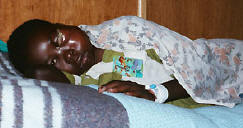 Wilms tumors, pneumonia, malnutrition, malaria, and HIV. The people who
have the courage or strength to come to the hospital often do not have the
money to afford the therapies. So, if we are able to make a diagnosis or
probable diagnosis, they lack the money for treatment or cure. Luckily the
various universities that support the exchange program provide many drug
samples to assist the people. Antibiotics, inhalers, anti-hypertensives,
anti-inflammatories and many more medications are given to these people.
Wilms tumors, pneumonia, malnutrition, malaria, and HIV. The people who
have the courage or strength to come to the hospital often do not have the
money to afford the therapies. So, if we are able to make a diagnosis or
probable diagnosis, they lack the money for treatment or cure. Luckily the
various universities that support the exchange program provide many drug
samples to assist the people. Antibiotics, inhalers, anti-hypertensives,
anti-inflammatories and many more medications are given to these people.
The education comes quickly and the amount of HIV is alarming. After
working with Dr Mamlin, who has shared his heart and mind with these
people, you realize the barriers this country faces: money, education,
acceptance. The city of Eldoret is full of signs warning about HIV and
educating the masses about how it is spread, but the people are scared
about finding out and do not have the money or resources for HIV
treatment. Some are in denial and some are ashamed. Some beat their
spouses and destroy families if a wife or child is diagnosed. Many
continue to spread the disease in response to their diagnosis. The fears
are high. However, you cry for joy when you meet one person who has the
courage to get tested and to have the family tested! Now the country needs
the medications and the IU team is working with grant money and various
foundations to make it happen -- not only treatment but also prevention.
As a resident, your day consists of rounding with the ward team during the
morning (starts approximately 8:30-9 AM) and working up new admissions
during the afternoons. Your team alternates admissions, so every other day
you will have new
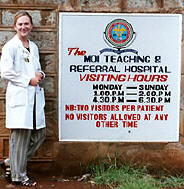 patients
arrive. On the off days, the team can give lectures or do procedures
during the afternoon. Your team consists of you (as the consultant), an
intern, 2 clinical officers, and 4-5 medical students. The average patient
census is between 10-20 patients. The medical and pediatric wards are all
in one area divided by a hallway. The outside hospital is lined with
barbed wire fence so that those who cannot pay their bill cannot leave.
The buildings are old and the wards are simple. One cart holds all the
medicines and one small trash can. The supplies are limited: gloves,
cotton balls, 2 sizes of needles, and alcohol wipes. The nurse's "station"
consists of a wooden desk and chair. The hallways are cleaned first thing
in the morning after dawn and after the deceased have been removed. patients
arrive. On the off days, the team can give lectures or do procedures
during the afternoon. Your team consists of you (as the consultant), an
intern, 2 clinical officers, and 4-5 medical students. The average patient
census is between 10-20 patients. The medical and pediatric wards are all
in one area divided by a hallway. The outside hospital is lined with
barbed wire fence so that those who cannot pay their bill cannot leave.
The buildings are old and the wards are simple. One cart holds all the
medicines and one small trash can. The supplies are limited: gloves,
cotton balls, 2 sizes of needles, and alcohol wipes. The nurse's "station"
consists of a wooden desk and chair. The hallways are cleaned first thing
in the morning after dawn and after the deceased have been removed.
You live at the IU house, a five house "compound" located in Eldoret that
is about 2 blocks from the hospital. The surrounding community is green
and beautiful and the walk to work is picturesque. The houses are gated
and guarded and create a safe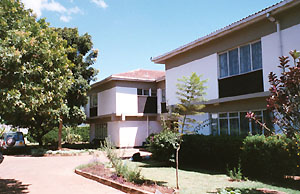 environment. Each house has 4 bedrooms and 2-3 bathrooms. Each house and
bedroom and named, and I lived in house 4 (the house of flowers, in the
Nandi flame room -- a red blossomed tree in Kenya). The rooms and living
style is like that of a dormitory but more comfortable. You certainly do
not feel that you are living in an impoverished third world country. The
other houses are full of other residents, staff and visitors. The IU house
is supported with a cook, office manager and assistant. While I was there,
the IU house was lead by Dr and Mrs. Joe Mamlin, two wonderfully
compassionate people who have devoted so much of their time, talent and
money to the Kenyans. The love what they do and are so respected by the
people. The offer so much to them: healing, hope, and genuine love. Dr.
Mamlin staffs
environment. Each house has 4 bedrooms and 2-3 bathrooms. Each house and
bedroom and named, and I lived in house 4 (the house of flowers, in the
Nandi flame room -- a red blossomed tree in Kenya). The rooms and living
style is like that of a dormitory but more comfortable. You certainly do
not feel that you are living in an impoverished third world country. The
other houses are full of other residents, staff and visitors. The IU house
is supported with a cook, office manager and assistant. While I was there,
the IU house was lead by Dr and Mrs. Joe Mamlin, two wonderfully
compassionate people who have devoted so much of their time, talent and
money to the Kenyans. The love what they do and are so respected by the
people. The offer so much to them: healing, hope, and genuine love. Dr.
Mamlin staffs
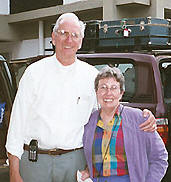 the
wards and runs an HIV clinic in the village. His drive to help and heal
these ill people is amazing and his search for he monetary and medicinal
resources is inspiring. Mrs. Mamlin dedicates her time to the childrens'
wards and heads all the creative projects, including art projects, books,
games and musical tapes. She loves the children and they love her.
Certainly while you live at the IU house, the Mamlins feel like your
parents. Lunch and dinner are shared with everyone sitting around a large
table and talking about the day. The stories to share are endless and the
large table gathering makes you feel warm. the
wards and runs an HIV clinic in the village. His drive to help and heal
these ill people is amazing and his search for he monetary and medicinal
resources is inspiring. Mrs. Mamlin dedicates her time to the childrens'
wards and heads all the creative projects, including art projects, books,
games and musical tapes. She loves the children and they love her.
Certainly while you live at the IU house, the Mamlins feel like your
parents. Lunch and dinner are shared with everyone sitting around a large
table and talking about the day. The stories to share are endless and the
large table gathering makes you feel warm.
Your weekends off gives you time to explore the city and country around
you.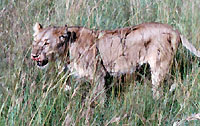 Whether you walk into the city to explore the handmade treasures or buy
fresh fruit or you travel across the country to see the national parks and
lakes full of beautiful animals, this place has so much to offer! While I
was there, I often ate at the local Kenyan restaurants (called "hotel")
with my medical students and discovered bakeries and surprisingly, a
number of internet cafes with my fellow residents. On weekends, I traveled
to Masaai Mara, Lakes Baringo and Bogoria and Nakura, Mount Kenya to name
a few. The city, despite its poverty and disease, is trying to expand and
develop itself. The beautiful, spacious green land and hills though is
such a contrast to the crowded urban areas of America.
Whether you walk into the city to explore the handmade treasures or buy
fresh fruit or you travel across the country to see the national parks and
lakes full of beautiful animals, this place has so much to offer! While I
was there, I often ate at the local Kenyan restaurants (called "hotel")
with my medical students and discovered bakeries and surprisingly, a
number of internet cafes with my fellow residents. On weekends, I traveled
to Masaai Mara, Lakes Baringo and Bogoria and Nakura, Mount Kenya to name
a few. The city, despite its poverty and disease, is trying to expand and
develop itself. The beautiful, spacious green land and hills though is
such a contrast to the crowded urban areas of America.
Kenya is truly God's country! AM
|
 appreciative of your care and your presence, but they struggle for food
and money. They sell their fruits and vegetables for pennies hoping to
provide for their families. But their greetings are always warm and
heartfelt and every passerby says "Jambo" (hello) and responds "Nzuri"
(I'm well). The people rise with the sun and go to bed with the sun. They
live without our modern distractions and make you realize how different
our life is from theirs, but also how we have chosen to have those
"distractions" in our life, and how we can change our life to be as
pleasurably simplistic as theirs.
appreciative of your care and your presence, but they struggle for food
and money. They sell their fruits and vegetables for pennies hoping to
provide for their families. But their greetings are always warm and
heartfelt and every passerby says "Jambo" (hello) and responds "Nzuri"
(I'm well). The people rise with the sun and go to bed with the sun. They
live without our modern distractions and make you realize how different
our life is from theirs, but also how we have chosen to have those
"distractions" in our life, and how we can change our life to be as
pleasurably simplistic as theirs. folders,
and the diagnostic tests are limited and often inaccurate. When you first
arrive as the "consultant" (teaching staff), you can become frustrated by
the fact that the students do not examine the patients daily, there are
usually no vitals, the labs take days to return (or may be lost), and the
therapies are limited for these who are critically ill. But the Moi
hospital helps the people of Eldoret. Patients survive and go home to
their families. Moi hospital provides education and jobs to many of the
people. It provides a source of healing and hope for the community.
folders,
and the diagnostic tests are limited and often inaccurate. When you first
arrive as the "consultant" (teaching staff), you can become frustrated by
the fact that the students do not examine the patients daily, there are
usually no vitals, the labs take days to return (or may be lost), and the
therapies are limited for these who are critically ill. But the Moi
hospital helps the people of Eldoret. Patients survive and go home to
their families. Moi hospital provides education and jobs to many of the
people. It provides a source of healing and hope for the community.
 Wilms tumors, pneumonia, malnutrition, malaria, and HIV. The people who
have the courage or strength to come to the hospital often do not have the
money to afford the therapies. So, if we are able to make a diagnosis or
probable diagnosis, they lack the money for treatment or cure. Luckily the
various universities that support the exchange program provide many drug
samples to assist the people. Antibiotics, inhalers, anti-hypertensives,
anti-inflammatories and many more medications are given to these people.
Wilms tumors, pneumonia, malnutrition, malaria, and HIV. The people who
have the courage or strength to come to the hospital often do not have the
money to afford the therapies. So, if we are able to make a diagnosis or
probable diagnosis, they lack the money for treatment or cure. Luckily the
various universities that support the exchange program provide many drug
samples to assist the people. Antibiotics, inhalers, anti-hypertensives,
anti-inflammatories and many more medications are given to these people. patients
arrive. On the off days, the team can give lectures or do procedures
during the afternoon. Your team consists of you (as the consultant), an
intern, 2 clinical officers, and 4-5 medical students. The average patient
census is between 10-20 patients. The medical and pediatric wards are all
in one area divided by a hallway. The outside hospital is lined with
barbed wire fence so that those who cannot pay their bill cannot leave.
The buildings are old and the wards are simple. One cart holds all the
medicines and one small trash can. The supplies are limited: gloves,
cotton balls, 2 sizes of needles, and alcohol wipes. The nurse's "station"
consists of a wooden desk and chair. The hallways are cleaned first thing
in the morning after dawn and after the deceased have been removed.
patients
arrive. On the off days, the team can give lectures or do procedures
during the afternoon. Your team consists of you (as the consultant), an
intern, 2 clinical officers, and 4-5 medical students. The average patient
census is between 10-20 patients. The medical and pediatric wards are all
in one area divided by a hallway. The outside hospital is lined with
barbed wire fence so that those who cannot pay their bill cannot leave.
The buildings are old and the wards are simple. One cart holds all the
medicines and one small trash can. The supplies are limited: gloves,
cotton balls, 2 sizes of needles, and alcohol wipes. The nurse's "station"
consists of a wooden desk and chair. The hallways are cleaned first thing
in the morning after dawn and after the deceased have been removed. environment. Each house has 4 bedrooms and 2-3 bathrooms. Each house and
bedroom and named, and I lived in house 4 (the house of flowers, in the
Nandi flame room -- a red blossomed tree in Kenya). The rooms and living
style is like that of a dormitory but more comfortable. You certainly do
not feel that you are living in an impoverished third world country. The
other houses are full of other residents, staff and visitors. The IU house
is supported with a cook, office manager and assistant. While I was there,
the IU house was lead by Dr and Mrs. Joe Mamlin, two wonderfully
compassionate people who have devoted so much of their time, talent and
money to the Kenyans. The love what they do and are so respected by the
people. The offer so much to them: healing, hope, and genuine love. Dr.
Mamlin staffs
environment. Each house has 4 bedrooms and 2-3 bathrooms. Each house and
bedroom and named, and I lived in house 4 (the house of flowers, in the
Nandi flame room -- a red blossomed tree in Kenya). The rooms and living
style is like that of a dormitory but more comfortable. You certainly do
not feel that you are living in an impoverished third world country. The
other houses are full of other residents, staff and visitors. The IU house
is supported with a cook, office manager and assistant. While I was there,
the IU house was lead by Dr and Mrs. Joe Mamlin, two wonderfully
compassionate people who have devoted so much of their time, talent and
money to the Kenyans. The love what they do and are so respected by the
people. The offer so much to them: healing, hope, and genuine love. Dr.
Mamlin staffs
 the
wards and runs an HIV clinic in the village. His drive to help and heal
these ill people is amazing and his search for he monetary and medicinal
resources is inspiring. Mrs. Mamlin dedicates her time to the childrens'
wards and heads all the creative projects, including art projects, books,
games and musical tapes. She loves the children and they love her.
Certainly while you live at the IU house, the Mamlins feel like your
parents. Lunch and dinner are shared with everyone sitting around a large
table and talking about the day. The stories to share are endless and the
large table gathering makes you feel warm.
the
wards and runs an HIV clinic in the village. His drive to help and heal
these ill people is amazing and his search for he monetary and medicinal
resources is inspiring. Mrs. Mamlin dedicates her time to the childrens'
wards and heads all the creative projects, including art projects, books,
games and musical tapes. She loves the children and they love her.
Certainly while you live at the IU house, the Mamlins feel like your
parents. Lunch and dinner are shared with everyone sitting around a large
table and talking about the day. The stories to share are endless and the
large table gathering makes you feel warm. Whether you walk into the city to explore the handmade treasures or buy
fresh fruit or you travel across the country to see the national parks and
lakes full of beautiful animals, this place has so much to offer! While I
was there, I often ate at the local Kenyan restaurants (called "hotel")
with my medical students and discovered bakeries and surprisingly, a
number of internet cafes with my fellow residents. On weekends, I traveled
to Masaai Mara, Lakes Baringo and Bogoria and Nakura, Mount Kenya to name
a few. The city, despite its poverty and disease, is trying to expand and
develop itself. The beautiful, spacious green land and hills though is
such a contrast to the crowded urban areas of America.
Whether you walk into the city to explore the handmade treasures or buy
fresh fruit or you travel across the country to see the national parks and
lakes full of beautiful animals, this place has so much to offer! While I
was there, I often ate at the local Kenyan restaurants (called "hotel")
with my medical students and discovered bakeries and surprisingly, a
number of internet cafes with my fellow residents. On weekends, I traveled
to Masaai Mara, Lakes Baringo and Bogoria and Nakura, Mount Kenya to name
a few. The city, despite its poverty and disease, is trying to expand and
develop itself. The beautiful, spacious green land and hills though is
such a contrast to the crowded urban areas of America.